Language
- English
- Español
- Français
- Italiano
- Português
- Deutsch
- Nederlands
Currency
- AUD Australian Dollar
- CAD Canadian Dollar
- EUR Euro
- GBP Pound Sterling
- USD US Dollar
- ZAR Rand

We are excited to unveil our 2024 Annual African Safari Report, offering a fresh perspective on the evolving landscape of African travel.
Leveraging our extensive internal data, this year’s report delves into the dynamic trends that are redefining the safari experience and broader travel patterns across the continent. Our goal is to provide you with unique insights into the journeys that traverse East and Southern Africa, as well as the coveted beach destinations of the Indian Ocean Islands.
Go2Africa is a distinguished travel specialist with over 25 years of first-hand safari experience. Operating from Cape Town and Nairobi, our motto, “we know because we go,” reflects our commitment to on-the-ground expertise. Collectively, we spend more than 365 days each year on safari, ensuring that our recommendations are based on personal experience and unbiased advice.
We are dedicated to not only curating your greatest adventure but also safeguarding the continent's wild places. We believe that exploring Africa should leave a lasting impression—on travellers and on the land itself. That's why every journey we design helps protect vital ecosystems and supports local communities, ensuring that people and nature can thrive together for generations to come.
For this year’s report, we analysed our internal enquiry data from 2022 to 2024 to identify prevailing trends in traveller preferences and behaviours. This analysis provided valuable insights into who is interested in travelling to Africa (i.e. families, solo travel, couples, etc), where across East Africa, Southern Africa, and the Indian Ocean Islands they are interested in travelling, and during which time of the year. As a secondary source, we examined Google search data to uncover emerging trends in all major safari destinations.
The months June to August consistently see the highest volume of searches related to African safaris. This data, sourced from Google Trends, reflects global search trends for top search terms related to African safari travel. While worldwide interest and searches seem to happen largely over July & August, this differs from our experience of volume of enquiries, which largely happens over January each year. This suggests that research on safari travel primarily happens mid-year, including those who may be on, or about to go on safari during this period, as this time of year falls into peak season safari travel.
Overall, search trends grew by 12% in 2024 compared to the previous year, with an outlying spike in search trend over the last week of December 2024, in particular for ‘africa safari' searches. While Google has remained a popular research tool for African safaris over the years, the use of AI tools is likely to increasingly become a supplemental resource to one’s safari research over the course of 2025.
“More people are turning to AI and alternative search tools to research and plan their safaris. The way travellers gather information and make decisions is evolving rapidly, and the industry is adapting to meet these new expectations.” – Maija de Rijk-Uys, Go2Africa Managing Director
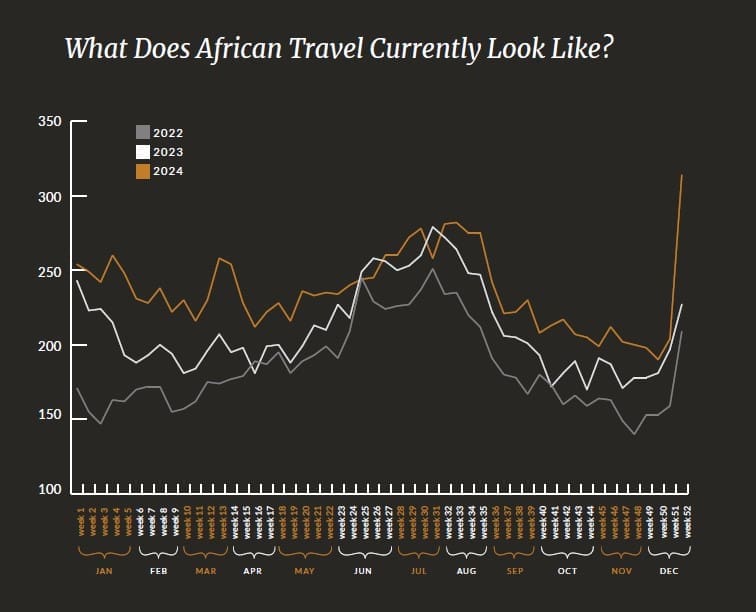
Over the past three years, we’ve observed notable fluctuations in traveller decision-making regarding African safaris. In 2022, 65% of travellers had a clear idea of where they wanted to go on safari, while 35% remained undecided. The following year, 2023, saw a rise in decisive travellers, with 72% having firm plans and only 28% undecided. However, in 2024, there was a slight reversal, as the percentage of decided travellers decreased to 68%, and those undecided increased to 32%.
This fluctuation suggests that while a majority of travellers continue to approach their safari plans with certainty, external factors or evolving preferences may be influencing a growing segment to remain undecided in their travel choices, especially first-time safari-goers, who may prefer to have someone explain the differences between the countries offering safaris.
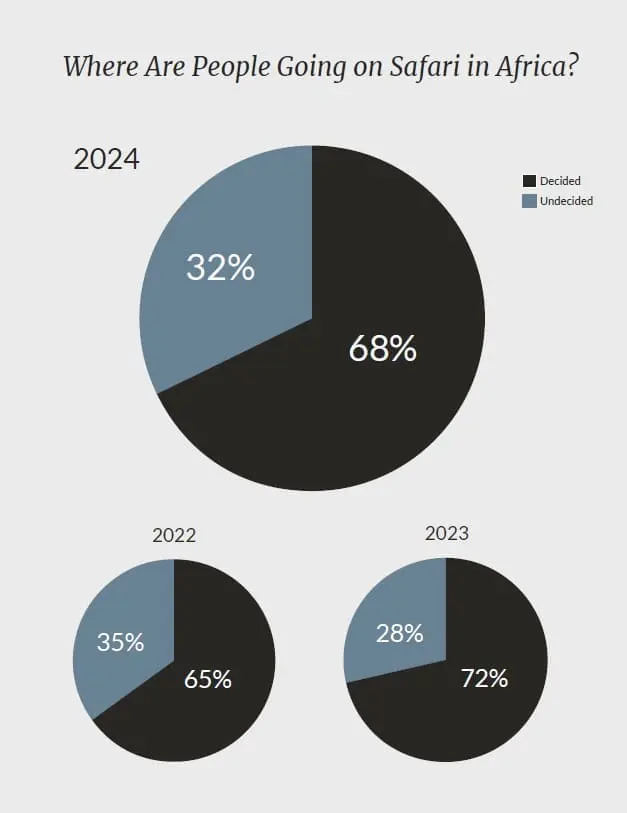
Over the past three years, the majority of those enquiring about an African safari requested information on safaris for a single destination rather than visiting multiple countries. However, in 2023, the percentage of travellers visiting multiple destinations increased from 29% to 34%, a trend that remained steady in 2024. This shift suggests a growing interest in combining different safari experiences across borders, likely influenced by increasingly better regional connectivity, with more flight routes and improved airline partnerships making multi-country travel more seamless. While single-destination safaris still dominate enquiries, the steady rise in multi-country trips may reflect a desire for more diverse safari experiences.
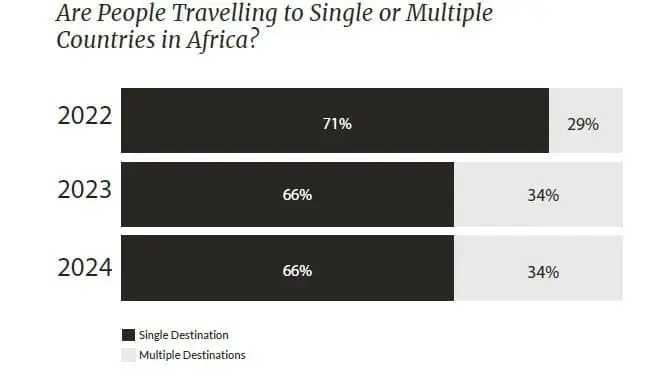
In 2024, the top three countries of interest were:
Notably, enquiries for Indian Ocean Island destinations like Seychelles and Mauritius grew by 71%, from 4.4% to 7.5%. Travel to Madagascar and Malawi more than doubled from 2023 to 2024. This is likely a result of tourism to Madagascar being boosted with new airlines and flight routes now serving the island.
“I've always tried to encourage travellers to consider beach destinations either on the continental mainland Africa, or the nearby islands, not only because there are so many world class options available that fit the category, but also because doing so allows for deepening the experience of this incredible continent. With so many popular beach destinations being highly commercialised, being able to target more of the hidden gems that have a meaningful positive impact for the surrounding communities is increasingly appealing for discerning travellers.” – Justin Chapman, African Safari Expert
While the percentage of enquiries for South Africa slightly decreased year-over-year, it remained the most popular destination, and enquiries for Tanzania grew by 0.6%. The top three destinations accounted for 60% of the total interest, identical to last year’s 60%.
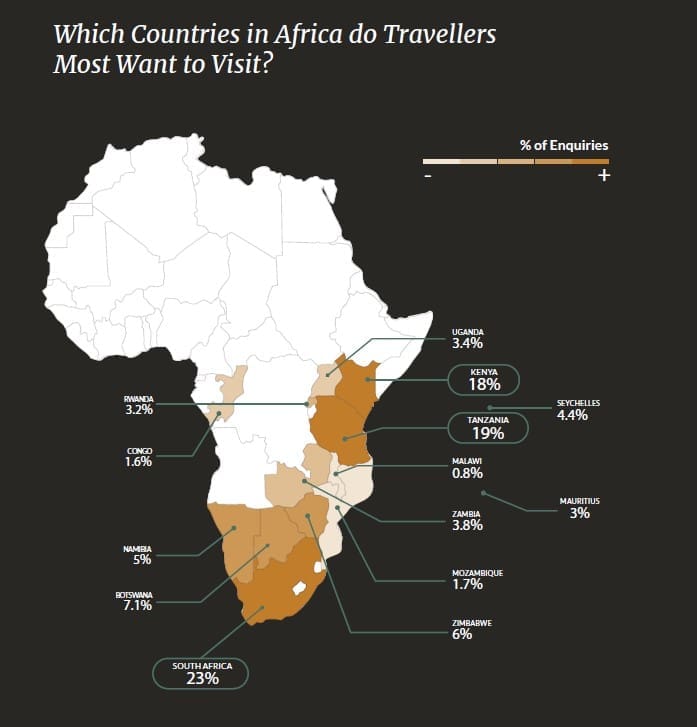
Safari travel follows a clear seasonal pattern, with most travellers enquiring after trips during mid-year and tapering off in the shoulder months. Across 2022, 2023, and 2024, June, July, August, and September consistently saw the highest percentage of requests, with July leading each year. This aligns with peak safari season, driven by the Great Migration in East Africa and great wildlife viewing conditions across the continent. While July remains the most popular month for African safaris, our data indicates that June, September and October are becoming increasingly popular months to travel, effectively widening the peak season. The slight increase in enquiries for April and May travel over the years suggests growing awareness of the benefits of shoulder-season travel, which often offers fewer crowds and better rates.
January, February, March, and November continue to be the least popular months for travel. These months can offer opportunities for off-season promotions and unique safari experiences. March falls into one of the best times of the year to visit the popular city of Cape Town, voted Time Out's “Best City in the World”, and Conde Naste's “Best Food City”. This time of year offers temperate weather and makes a great stop on a Southern African safari. Although February has the lowest number of enquiries, there are still several great destinations to visit in Africa in February.
Overall, these trends reflect a strong alignment between when travellers research and book safaris and Africa's prime wildlife viewing periods. Due to the popularity and broadening of the peak season, booking well in advance, especially for peak season, is highly recommended. We'll always recommend enquiring at least a year in advance.
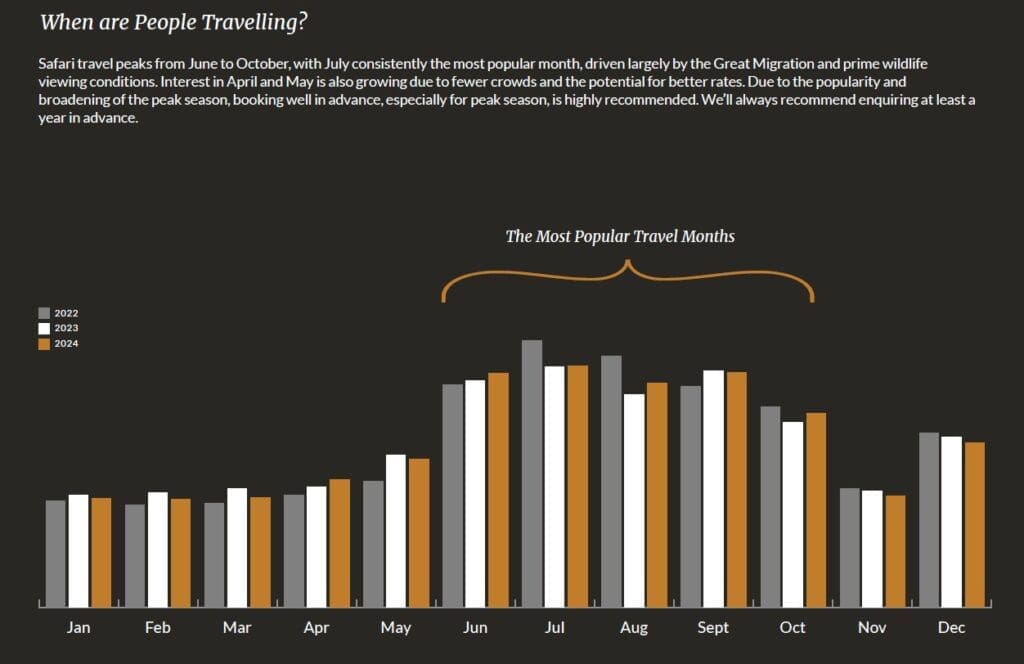
Interest in ”bucket list destinations” such as Kruger National Park and Victoria Falls increased significantly. Enquiries for the Kruger rose by 6.7%, while Victoria Falls saw a 4.1% increase.
Migration safaris also experienced a small uptick in interest by 0.5%. The Big 5 has remained the most enquired-about experience for all three years, as it is a quintessential safari experience. It has however shown a slight decline each year. This is coupled with the shift we're seeing in more customers including an immersive experience into their itinerary.
Curiously, interest in gorilla trekking dropped by 6.3% at time of enquiry, however bookings for travel to Uganda and Rwanda more than doubled compared to 2023. We're finding that a gorilla trekking experience is an increasingly popular and incredible add-on to a more classic safari trip.
“Experienced travellers are moving beyond traditional safari routes and seeking hands-on experiences that make a difference. Instead of just observing, guests want to be part of the conservation effort—places like Usangu and Green Safaris offer immersive activities that allow them to contribute directly. There's also a shift to combining classic itineraries like Kruger and Victoria Falls, with more interest in hidden gems such as Zambia's Kafue, Ruaha's Usangu, Seychelles' Platte Island, Zimbabwe's Matusadona, and the pristine waters of Lake Malawi.” – Liesel Van Zyl, Head of Positive Impact & Product Development
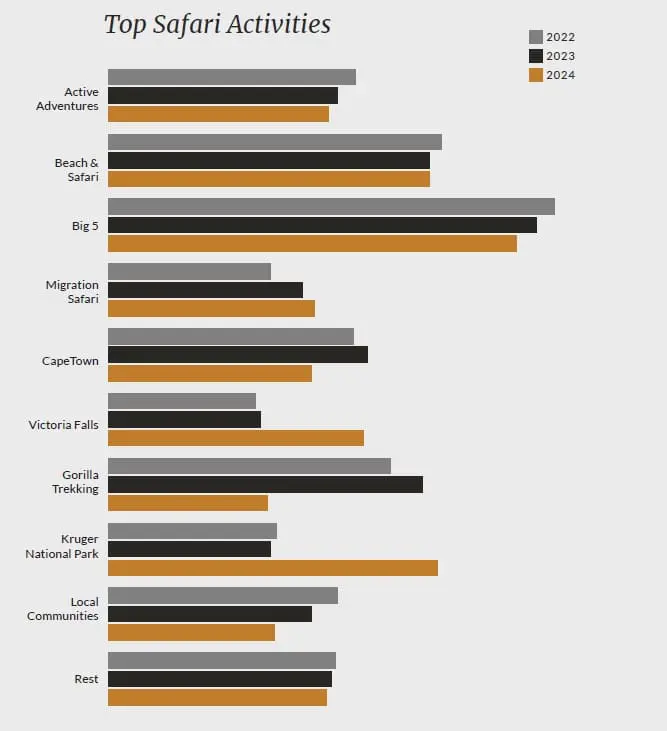
2024 data indicated that travellers are generally opting for longer trips. Enquiries for trips lasting less than one week dropped by 40% year-over-year, while enquiries for other durations increased. Trips lasting 10 days remain the most popular, accounting for 36% of enquiries.
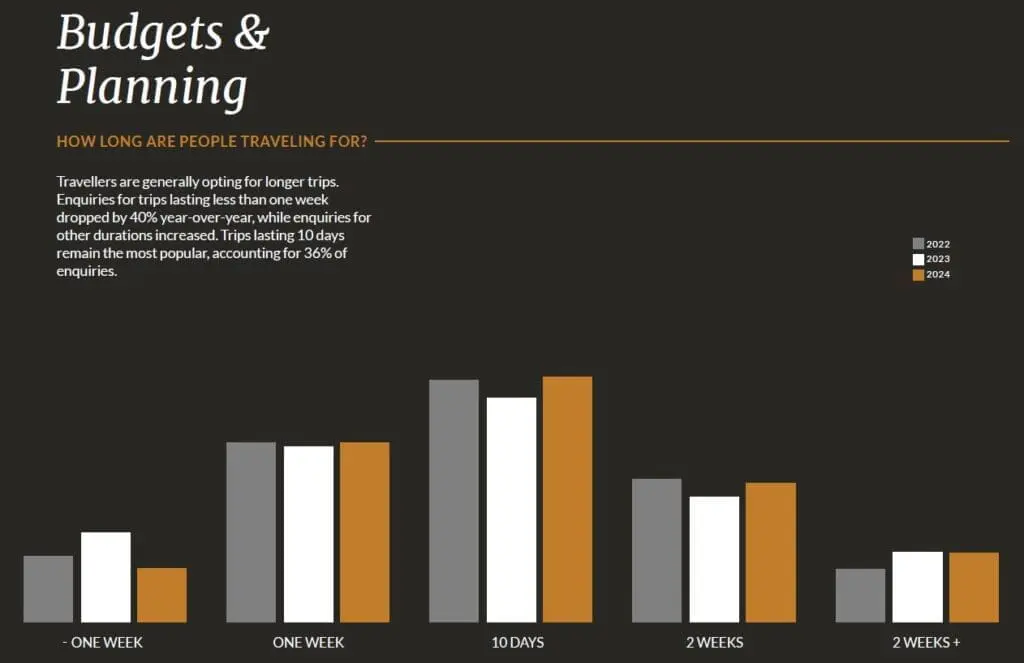
The average time between when enquiries were made and actual travel date has increased over the years. The longest time between an enquiry and its respective travel date in 2023 was 3 years, while in 2024, it extended to 10 years in between. There was an average of enquiring 19 weeks in advance, one week longer than the previous year. Once again this links back to safari camps generally being a lot smaller than a typical hotel, and availability can run out fast, particularly during peak season travel. If you're after a specific itinerary, it's best to book well in advance because of this.
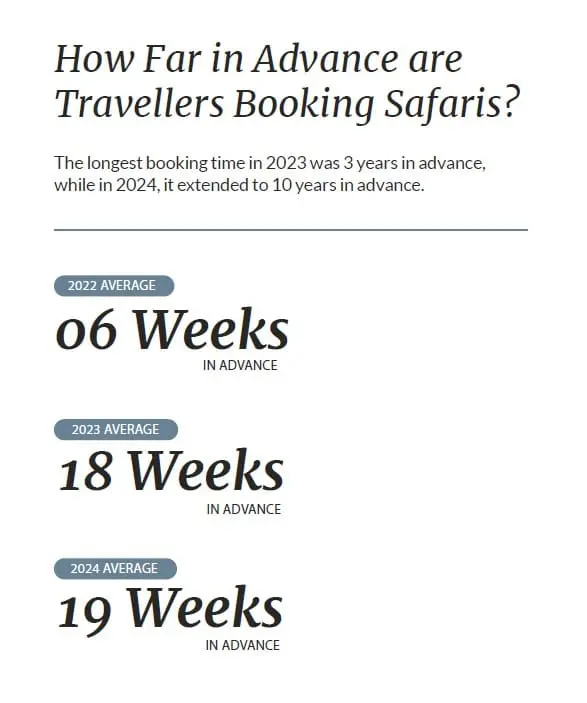
“Planning a safari 19 weeks in advance really depends on the season you’d like to travel in. For the low season, this should be an alright approach. But for peak season—the June through October period – especially July/August – or over the festive period, to truly maximize the availability of choices, you ideally want to be planning a year out, given the current level of travel demand. It's not that there won't be any options 19 weeks out, just that the available options will likely be heavily limited. For that once-in-a-lifetime dream trip, you really want to have as many options as possible to choose from.” – Justin Chapman, African Safari Expert
There was once again an overall shift from medium budgets to medium-high budgets. 2023's average budget sat in between $5,500 to $6,500, while 2024's average budget was between $5,500 to $7,500. Medium budgets decreased from 53% to 39% year-over-year, while medium-high budgets increased from 36% to 59%, reflecting a combination of an increase in desire for premium experiences, longer trips and an increase in the cost of safari travel.
“Private partnerships benefiting local communities are helping diversify safari offerings. There's now a wider range of options to suit different budgets, making safaris more accessible to a broader audience. This expansion is bringing in new travellers who may not have previously considered a safari due to cost.” – Liesel Van Zyl, Head of Positive Impact & Product Development
Every year we look at the average price spent on a safari based on the country that booking came from. Due to outlying countries with a very small number of bookings, it always makes this data quite interesting to look at, although not a true reflection on high spending countries who have larger sample sizes. These ‘top spenders' represent a small fraction of the total bookings—only 4.1% in 2024.
Countries like Thailand, Mexico, and the Philippines have consistently ranked among the top spenders in both 2023 and 2024. Between 2023 and 2024, the highest spending countries changed from Italy to Lithuania, and Belgium to Mexico in second place. Notably, Mexico was the top spender in 2022 and has maintained its position in the top tier for three consecutive years.

When examining traveller types, the distribution has remained relatively stable year-over-year. Travelling with a partner continues to be the most popular choice, accounting for 45% of travellers. Solo travel has seen a slight increase, rising from 12% to 13%. Larger groups who enquire with us are generally interested in tailor-made group safari experiences, as opposed to scheduled group trips, creating a more flexible and unique safari experience. This makes it an incredible option for family and multi-generational travel, providing experiences and activities suited to all ages.
“There's been a noticeable increase in families choosing safaris as their ideal holiday. More lodges and experiences are catering to children and multi-generational travel, making it an incredibly rewarding experience for families looking to connect with nature together.” – Maija de Rijk-Uys, Go2Africa Managing Director

In terms of country-specific interest, the United States remains the leading nation for safari enquiries for Go2Africa, followed by Canada, Australia, and the United Kingdom. The top three countries accounted for 74% of enquiries in 2023, decreasing slightly to 70% in 2024. Mexico has shown a notable increase, with its percentage of inquiries rising by 1.2%, surpassing South Africa, which held the fifth position last year.

Within the United States, California continues to generate the highest number of enquiries, followed by New Jersey and Florida. Notably, New York, which was in third place last year, has been surpassed. Among enquiries from California, nearly half (44%) are from travellers planning trips with their partners. When adjusting for population size, New Jersey leads in enquiries per capita.

Reflecting on last year's trends, Go2Africa Managing Director Maija de Rijk-Uys and Liesel Van Zyl, Head of Positive Impact & Product Development, highlight key themes that continue to shape the safari travel landscape.
As awareness of Africa's vital role in global biodiversity grows, conservation efforts are receiving a much-needed boost. Established reserves are securing increased funding to combat threats like poaching and habitat loss, while new parks—such as Usangu in Tanzania, Gorongosa in Mozambique, Busanga Plains in Zambia, and Matusadona in Zimbabwe—are emerging as conservation success stories. At the same time, safari lodges and camps are prioritising sustainability by incorporating solar power and electric safari vehicles, creating quieter, low-impact game drives that enhance the wildlife experience. Additionally, travelers are showing a stronger interest in hands-on conservation activities, such as those offered at Usangu and by Green Safaris, allowing them to contribute directly to sustainability efforts. In 2025, the focus on responsible travel and eco-conscious safaris is set to redefine the industry, ensuring a more harmonious relationship between tourism and nature.
In 2025, many safari-goers are looking beyond traditional itineraries, seeking experiences that leave a lasting impact as well as new experiences. Instead of simply observing wildlife, travellers are wanting to be part of the conservation effort. This shift is also driving interest in hidden gems over classic routes like Kruger and Victoria Falls. Destinations such as Zambia's Kafue, Zimbabwe's Matusadona, Seychelles' Platte Island, and the pristine waters of Lake Malawi are attracting visitors who crave unique, off-the-grid adventures. Additionally, the fusion of remote travel with high-end wellness and culinary experiences is gaining momentum, with eco-lodges incorporating farm-to-table dining, plant-based cuisine, and immersive food experiences like coffee roasting. As travelers prioritize sustainability, personalization, and exclusivity, 2025 is set to redefine the safari experience, blending adventure with purpose.
“We're seeing an exciting blend of far-flung destinations with world-class health and foodie offerings. Take Seychelles' Platte Island—it's just an hour's flight from the main island but offers a plant-based restaurant, hands-on coffee roasting experiences, and innovative dishes using locally sourced ingredients. These types of offerings appeal to well-travelled guests looking for something new, high-quality, and deeply personalised.” – Liesel Van Zyl, Head of Positive Impact & Product Development
Artificial intelligence is set to transform the way travellers plan their safaris, making the process more personalised and efficient. AI-powered image and voice search tools are making it easier for travellers to find and book safaris based on inspiration from social media and online content. As technology continues to evolve, AI is set to streamline the safari booking experience, offering a seamless blend of personalisation, convenience, and discovery, while the industry is rapidly adapting to these changes.
We're seeing more non-safari specialists entering the market, offering safari packages without the deep expertise needed to craft truly seamless and immersive experiences. While this expansion might make safaris appear more accessible, it's a strong reminder of why working with seasoned Africa Safari Experts is essential. From understanding the nuances of wildlife movements to ensuring smooth logistics in remote areas, experienced specialists can elevate a trip from simply ‘good' to truly extraordinary.
As the desire for unique and adventure-filled vacations rises, we've noticed that families are increasingly seeking out safaris as a holiday choice. Many African safari lodges offer family-friendly accommodations, specialised guides, and tailored itineraries that cater to all ages. Families can now engage in hands-on activities like wildlife tracking, bush cooking classes, and conservation projects, making safaris both immersive and informative. This trend is expected to flourish as parents prioritise memorable experiences that cultivate environmental awareness and a deep connection to the natural world.
Download our Annual African Safari Travel Report here: